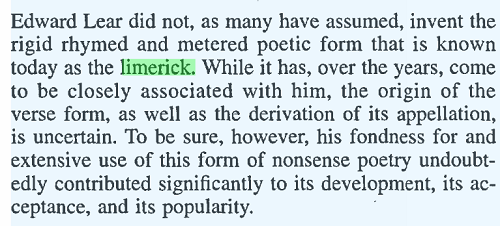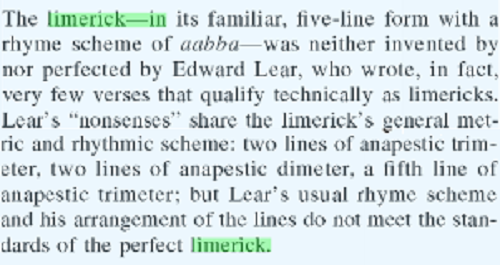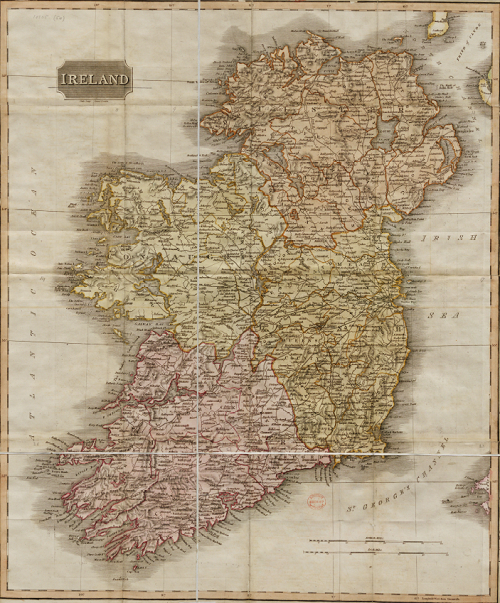By Melissa Rayner
May 12 is National Limerick Day–as to which nation’s “national”, that’s anybody’s guess, but let’s all celebrate regardless!
A-a-a-ahem, there once was a man from Nantucket, who–Hey, wait a second. Despite their recent popularity as such, not all limericks are dirty. They can be trendy and cutting-edge like these two. [1]
INTERNET JUNKY YouTube is quite an addiction, Almost worse than fan fiction Most people talk, While some like to stalk, And others should work on their diction.
The Math For Global Warming
Round up supposed heat from Earth's core,
Divide Earth's albedo by four,
Then puff up Earth's stratus
Of bovine-passed flatus
With rhythms prefixed by Al Gore.
Or they can also be deeply personal and moving. [2]
A humorous picture-limerick by Edward Lear from his 1879 collection 'More Nonsense' is analyzed. The picture of a man riding atop a hare is accompanied by a short limerick that may or may not be a metaphor for suicide. It is suggested that the picture-limerick puns a Japanese term for suicide that had made its way into English usage around the time that Lear wrote it. Other interpretations suggest that the picture of a man atop a hare while holding on to its tail could be a metaphor for masturbation, which was considered then to be a lesser form of suicide. There was an old man whose despair Induced him to purchase a hare. Whereon one fine day, he rode wholly away, Which partly assuaged his despair.
While popularly associated with Lear, the infamous author of the “suicide limerick,” the limerick probably didn’t originate with this particular poet. [3]
Because at its heart, a limerick is, after all, just a poem. [4]
…or, you know, a city in Ireland. [5]
Happy National Limerick Day!
[alert-info]
 About the Author
About the Author
Melissa is obsessed with books, birds, and bonbons. She is a new mom and holds an MA in Applied Sociology. She also writes fiction and skips about the interweb as Emlyn Chand.
[/alert-info]
REFERENCES:
- Morice, David. “Limerickshaws: the grand finale.” Word Ways 40.4 (2007): 300+. Literature Resource Center. Web. 11 May 2015.
- Dilworth, Thomas. “Edward Lear’s Suicide Limerick.” Review of English Studies 46.184 (Nov. 1995): 535-538. Rpt. in Children’s Literature Review. Ed. Rebecca Blanchard. Vol. 75. Detroit: Gale, 2002. Children’s Literature Review Online. Web. 11 May 2015.
- Ord, Priscilla A. “There Was an Old Derry Down Derry, Who Loved to Make Little Folks Merry: A Closer Look at the Limericks of Edward Lear.” Literary Onomastics Studies 12 (1985): 93-118. Rpt. in Poetry Criticism. Ed. Michelle Lee. Vol. 65. Detroit: Gale, 2006. Poetry Criticism Online. Web. 11 May 2015.Harmon, William. “Lear, Limericks, and Some Other Verse Forms.” Children’s Literature 10 (1982): 70-76. Rpt. in Children’s Literature Review. Ed. Jelena Krstovic. Vol. 169. Detroit: Gale, 2012. Children’s Literature Review Online. Web. 11 May 2015.
- Tigges, Wim. “The Limerick: The Sonnet of Nonsense?” Explorations in the Field of Nonsense. Ed. Wim Tigges. Amsterdam: Rodopi, 1987. 117-133. Rpt. in Children’s Literature Review. Ed. Jelena Krstovic. Vol. 169. Detroit: Gale, 2012. Children’s Literature Review Online. Web. 11 May 2015.
- “(A New Travelling Map of Ireland). 10805. (54.).” British Library: 19th Century European Sheet Maps. Primary Source Media. Nineteenth Century Collections Online. Web. 11 May 2015.






Hi.
Just for the record, the “Nantucket” limerick you refer to is not, like many others are, “dirty”. Just a good pun.
There once was a man from Nantucket
Who kept all his cash in a bucket.
His daughter, named Nan,
Ran away with a man,
And as for the bucket
Nantucket.
Also, just a couple of added words to your effort would make yours fit the ‘classic’ formal form:
The YouTube is quite an addiction,
Almost worse than the current fan fiction
Though most people talk,
While some like to stalk,
Some others should work on their diction.
Thanks for a bit of fun.